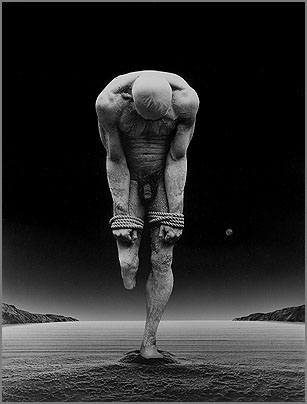Summary
Anti-OedipusQuestions
"While I live, no woman will rule me." [Sophocles, Antigone 525]
Notes
"You do not love someone you have hated, not even after death." [Sophocles, Antigone 522]
Midnight News:
Oedipus Questions Laios' Shepherd About His Past
Summoned by the royal family, the old shepherd who was the only survivor of Laios' murder, arrived to Thebes today. King Oedipus immediately questioned the shepherd about his involvement in King Laios' affairs.
The old shepherd underwent intense interrogation today by Oedipus. Oedipus was reportedly asking the shepherd about his relationship with Laios. The shepherd, whose name is being withheld, was surprisingly tight-lipped about his past, not unlike Tierisias, who came to Thebes before under Oedipus' request. If it had not been for the Corinthian messenger who came bearing life changing news for Oedipus, the king wouldn't have gotten any information from the shepherd.
However, the shepherd did reveal some truth that explained all the events that happened in the past when Laious and Iocaste's child "died" mysteriously. Apparently, according to the shepherd, Iocaste instructed him to get rid of the baby, to which Oedipus proclaimed: "An unspeakable mother!" Furthermore, the shepherd said that instead of killing the child, he pitied it and gave him to the messenger who used to be a herdsman in his youth.
All of these events occurred because an oracle prophesied many years ago that the child borne to Laios and Iocaste will grow up to kill his father and marry his mother. Fearing the fulfillment of this prophecy, the king and queen allegedly instructed the shepherd to get rid of the child. However, the shepherd claimed that he had given the child to the messenger and the messenger in turn gave the child to King Polybus and Queen Merope of Corinth. If all of this is true, then that child must be Oedipus, which means that he had inadvertently fulfilled the prophecy by killing his biological father, Laios, and marrying his biological mother, Iocaste.
When Oedipus realized this, he exclaimed in disbelief and horror: "Ah God! It was true! All the prophecies!--Now, O Light, may I look on you for the last time! I, Oedipus, Oedipus, damned in his birth, in his marriage damned, damned in the blood he shed with his own hand! Afterwards, he rushed into the palace, leaving the royal court in a mixture state of amazement and despair.
Program: An Hour with Doctor Freud:
OEDIPUS COMPLEX: the childhood desire to sleep with the mother and to kill the father. The source of this complex in his Introductory Lectures (Twenty-First Lecture): "You all know the Greek legend of King Oedipus, who was destined by fate to kill his father and take his mother to wife, who did everything possible to escape the oracle's decree and punished himself by blinding when he learned that he had none the less unwittingly committed both these crimes" (16.330). Sophocles' play, Oedipus Rex, illustrates a formative stage in each individual's psychosexual development, when the young child transfers his love object from the breast (the oral phase) to the mother. At this time, the child desires the mother and resents (even secretly desires the murder) of the father. (The Oedipus complex is closely connected to the castration complex.) Such primal desires are, of course, quickly repressed but, even among the mentally sane, they will arise again in dreams or in literature. Among those individuals who do not progress properly into the genital phase, the Oedipus Complex can still be playing out its psychdrama in various displaced, abnormal, and/or exaggerated ways...
"We must not wage vain wars with necessity." [Sophocles, Antigone 1105]

Sophocles:
Pasolini: 1967















 "...there is no evil worse than disobedience." [Sophocles, Antigone 673]
"...there is no evil worse than disobedience." [Sophocles, Antigone 673]